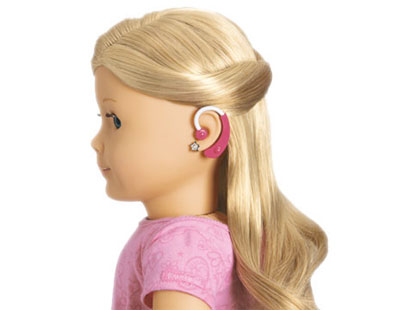American Girl Dolls Embrace Differences and Disabilities

I must admit, I find American Girl Dolls slightly unnerving. They are so eerily lifelike, and I know it's a cliché, but the eyes really do follow you everywhere. My daughter has one, and we put it in the closet every night because mommy is a little crazy.
Despite these misgivings, it's hard not to cheer for a doll company that goes out of its way to represent girls from all walks of life and every circumstance. The new Special Sparkle section in its holiday catalog includes a miniature service dog in harness, a hearing aid and an allergy-free lunch kit.
"We have a long history of speaking to diversity and making girls feel good about themselves, and this is just another way we are expanding on the idea," said American Girl Doll spokeswoman Julie Parks.
Whereas many dolls from high-end companies resemble a stereotypical beauty unattainable for most little girls, American Girl has always seemed to strive for all-inclusiveness. The dolls come in a vast selection of skin tones, hair color and eye color, which can be mixed and matched so the doll resembles its owner. Now they can also be fitted with glasses, braces for the teeth, crutches or a wheel chair, and the company recently began to offer dolls without hair to represent those who have lost hair to cancer.
American Girl books and movies also do a good job of highlighting problems girls are likely to encounter in life. This year's "Doll of the Year" McKenna is a talented gymnast who struggles with injuries and a learning disability. In the book and movie about her experiences, Jesse, her brainy friend and tutor, is confined to a wheel chair.
Dr. Ari Brown, a developmental pediatrician in Austin, Texas, applauds American Girl's mission of highlighting differences and a message of acceptance.
"I think it's great American Girl tries to have dolls that have the same hodgepodge of traits and features you actually see in kids," Brown said.
Brown said she also believes playing with a doll that uses a hearing aid, requires a special diet or depends on a service dog can be an enriching experience for all girls, even if they themselves don't have special needs.
"It can help kids learn to be more accepting of others who are different from them," she said.
Perhaps because acceptance for all is part of American Girl's mission, it has been more successful than other toy makers that have attempted to make dolls with disabilities. Barbie's wheelchair-bound friend, Share a Smile Becky, is a notable example. Even consumers who overlooked the condescending name couldn't forgive the fact that Becky's chair didn't fit into the Barbie Dream House elevator.
Girl Power aside, all this diversity might have a limited reach. The price tag for a doll is $105, and from there the cash register never seems to stop ringing. The wheel chair costs $38, the hearing aid $9 and the allergy-free lunch bag $28. Let's not even mention the hair styling, ear piercing and tea parties.
Yet in spite of the steep cost of ownership, Parks said feedback has been overwhelmingly positive for the dolls in general and the new disability accessories in particular.
"Parents realize they are investing in something that builds strong character and helps every girl reach their full potential, no matter who they are or what they look like," she said. "It's all about engaging them in positive experiences and helping them fit in."